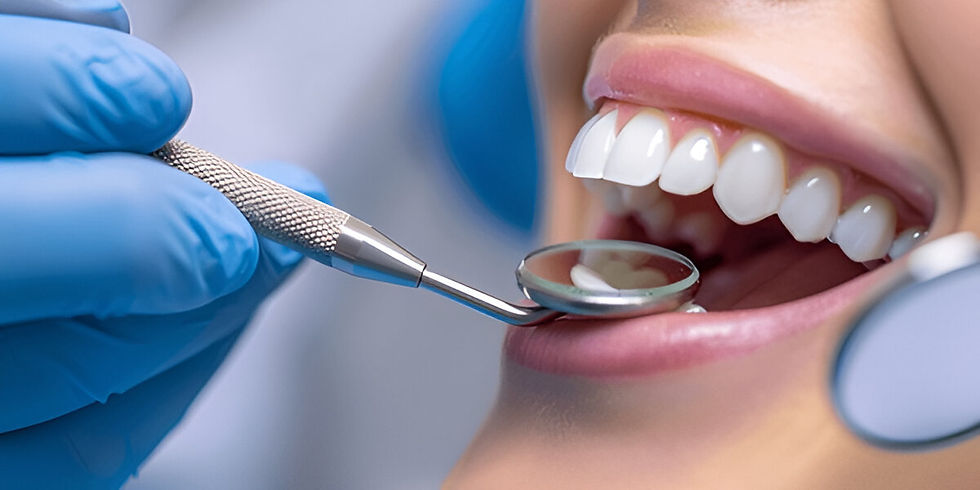What Is a Dentist? Everything You Need to Know About Dental Care
- Kiara Waylen
- Sep 9, 2025
- 4 min read
A healthy smile starts with proper oral hygiene and regular visits to your dentist. Whether it’s for routine checkups, a cavity filling, or cosmetic procedures, dentists play a crucial role in maintaining oral health for individuals of all ages. But what exactly does a dentist do, and why is dental care so important?

In this comprehensive guide, we’ll explore what a dentist is, the types of services they offer, the benefits of regular dental visits, and how to choose the right dentist for your needs.
Who Is a Dentist?
A dentist is a medical professional who specializes in oral health, diagnosing and treating issues related to the teeth, gums, and mouth. Dentists complete several years of dental school and hold either a Doctor of Dental Surgery (DDS) or Doctor of Dental Medicine (DMD) degree.
Dentists are essential for preventing oral diseases, detecting problems early, and providing treatment to improve both the function and appearance of your teeth. From simple cleanings to complex procedures, a dentist ensures your mouth remains healthy and pain-free.
What Services Does a Dentist Offer?
Dentists offer a wide range of services tailored to maintaining and improving your oral health. Here are some of the most common:
1. Routine Dental Exams
Regular dental checkups help identify potential problems before they become serious. A typical exam includes inspecting your teeth, gums, tongue, and mouth for signs of cavities, gum disease, and oral cancer.
2. Dental Cleanings
Professional cleanings remove plaque and tartar that daily brushing and flossing can’t reach. This helps prevent gum disease and keeps your breath fresh.
3. Fillings and Restorations
If you have a cavity, your dentist will remove the decayed part of the tooth and fill it with a durable material such as composite resin or amalgam.
4. Crowns and Bridges
Dentists use crowns to cover damaged teeth, while bridges replace missing teeth. These restorations improve your bite and overall dental function.
5. Root Canal Treatment
If tooth decay reaches the pulp of the tooth, a root canal may be needed to remove the infection and save the tooth.
6. Tooth Extractions
In cases of severe damage or overcrowding, dentists may extract teeth to relieve pain or make space for orthodontic treatment.
7. Cosmetic Dentistry
Many dentists offer cosmetic services like teeth whitening, veneers, and bonding to enhance the appearance of your smile.
8. Orthodontic Referrals
If you need braces or aligners, your general dentist can refer you to a trusted orthodontist for specialized care.
Why Visiting a Dentist Is So Important?
Regular visits to the dentist are not just about clean teeth—they are essential for your overall health. Here’s why:
Early Detection of Dental Issues: Cavities, gum disease, and even oral cancer can go unnoticed without a professional exam.
Preventive Care: Routine cleanings and exams help stop problems before they start, saving you time and money.
Better Overall Health: Poor oral health is linked to serious conditions like heart disease, diabetes, and stroke.
Improved Confidence: A clean, white smile can boost your self-esteem and improve your social interactions.
How Often Should You Visit the Dentist?
Most dental professionals recommend visiting a dentist every six months for a cleaning and exam. However, if you have specific dental issues like gum disease, you may need more frequent visits.
Children should start seeing a dentist by their first birthday or within six months of their first tooth erupting. Early visits help establish good oral hygiene habits and allow the dentist to monitor development.

Choosing the Right Dentist
Finding the right dentist for your needs can greatly impact your dental experience. Here are some tips to help you choose:
1. Check Credentials and Experience
Make sure the dentist is licensed and has a good reputation. Look for memberships in organizations like the American Dental Association (ADA).
2. Read Patient Reviews
Online reviews can provide valuable insight into the dentist’s communication skills, office environment, and quality of care.
3. Consider Location and Office Hours
Choose a dental office that is conveniently located and offers hours that fit your schedule.
4. Evaluate Services Offered
Some dental clinics offer comprehensive care including cosmetic dentistry, orthodontics, and emergency dental services.
5. Ask About Insurance and Payment Options
Make sure the dentist accepts your insurance plan and provides flexible payment options if needed.
Common Dental Problems Treated by Dentists
Dentists are trained to diagnose and treat a wide variety of dental issues, including:
Cavities (Tooth Decay)
Gingivitis and Periodontitis (Gum Disease)
Tooth Sensitivity
Cracked or Broken Teeth
Missing Teeth
Oral Infections
Bad Breath (Halitosis)
By addressing these issues early, dentists help patients avoid more complex and expensive procedures in the future.
The Role of Technology in Modern Dentistry
Modern dentists use advanced technology to enhance patient care and comfort. Some common tools include:
Digital X-Rays: Faster and less exposure to radiation.
Intraoral Cameras: Allow patients to see real-time images of their teeth.
Laser Dentistry: Minimally invasive treatment for gums and cavities.
CAD/CAM Technology: Same-day crowns and restorations using 3D imaging.
This technology not only improves accuracy but also makes dental visits more efficient and less intimidating.
Dental Care Tips Between Visits
To maintain a healthy smile between dental visits, follow these daily oral hygiene practices:
Brush your teeth at least twice a day with fluoride toothpaste.
Floss daily to remove plaque and food particles.
Limit sugary snacks and drinks.
Use an antimicrobial mouthwash.
Drink plenty of water to rinse away bacteria.
Conclusion
A dentist is your partner in achieving and maintaining optimal oral health. From preventing tooth decay to transforming your smile with cosmetic procedures, dentists provide essential care that impacts both your health and quality of life.
Whether you’re looking for routine checkups, restorative treatments, or cosmetic enhancements, choosing the right dentist can make all the difference. Don’t wait for a dental problem to appear—schedule your next appointment today and take the first step toward a healthier, brighter smile.



Comments